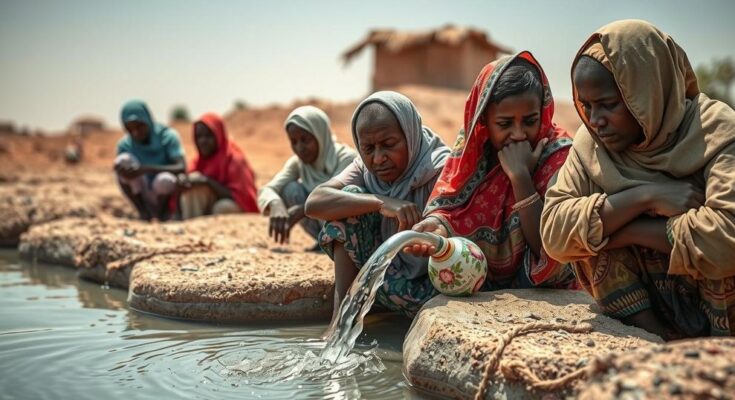Sudanese refugees in Chad are facing critical water shortages as many flee violence in their homeland. Relocated to Tongori camp, they struggle with inadequate water supplies, compelling them to find unsafe sources. The dire conditions highlight the need for urgent humanitarian intervention to support this vulnerable population amidst ongoing hostilities in Sudan.
Sudanese refugees in Chad endure severe water shortages as they escape violence and instability in their homeland. Aisha Adam Ishag, a survivor of the massacres in El Geneina, is now residing in Tongori camp in eastern Chad, having been forcibly relocated from Adré camp. She reports that daily rations of approximately 60 liters of water are inadequate for her and her fellow refugees, forcing them to resort to fetching contaminated water from nearby valleys. The harsh conditions in Tongori camp have exacerbated existing tensions between refugees and local communities, with the latter seeking to reclaim lands previously occupied by refugees.
Aisha expressed her concerns about the lack of clean drinking water, which has been a source of friction in the camp. Additionally, Fatima Adam Idris highlighted the dire situation, stating that the refugees have been enduring these conditions for over a year, struggling to find basic necessities like water, food, and clothing. While some refugees have found alternative sources of water, such as nearby valleys, the overall situation remains critical, with the absence of humanitarian support compounding their suffering. The ongoing influx of Sudanese refugees has placed immense pressure on limited resources in the region, prompting calls for urgent assistance from international organizations.
Chad has become a sanctuary for over 600,000 Sudanese refugees, many of whom fled the violence of the Darfur conflict that began in 2003, as well as the recent escalation of violence following the war between the Sudanese Armed Forces and the Rapid Support Forces in April 2023. The adverse conditions in refugee camps, particularly in terms of essential services like potable water, have led to increased suffering and tensions within host communities. The United Nations High Commissioner for Refugees (UNHCR) has sounded the alarm over the critical humanitarian situation in eastern Chad, where refugees are displaced and lacking basic necessities.
The situation of Sudanese refugees in Chad is dire, particularly concerning access to clean drinking water. The forced relocation to remote camps with inadequate services has intensified their struggles, leading to serious health risks due to contaminated water sources. International aid is urgently needed to alleviate the humanitarian crisis facing these vulnerable populations, as the ongoing conflict in Sudan continues to drive refugees into precarious circumstances.
Original Source: www.dabangasudan.org




